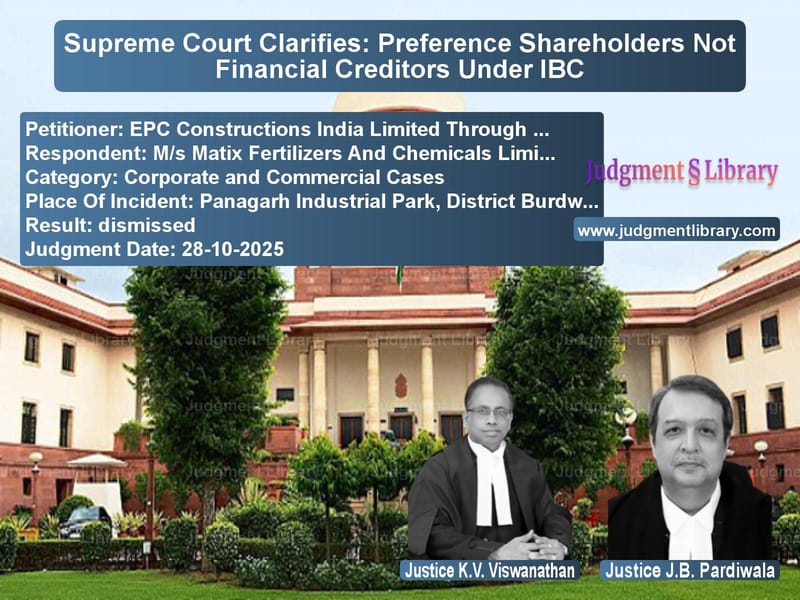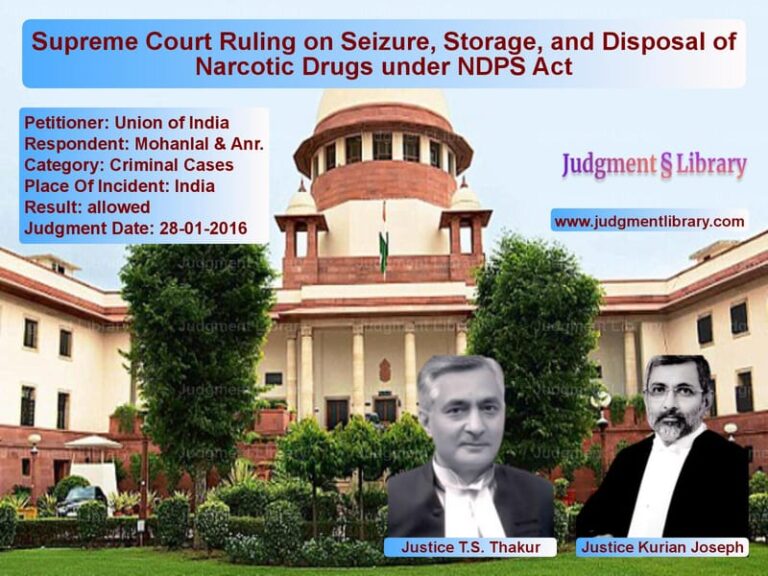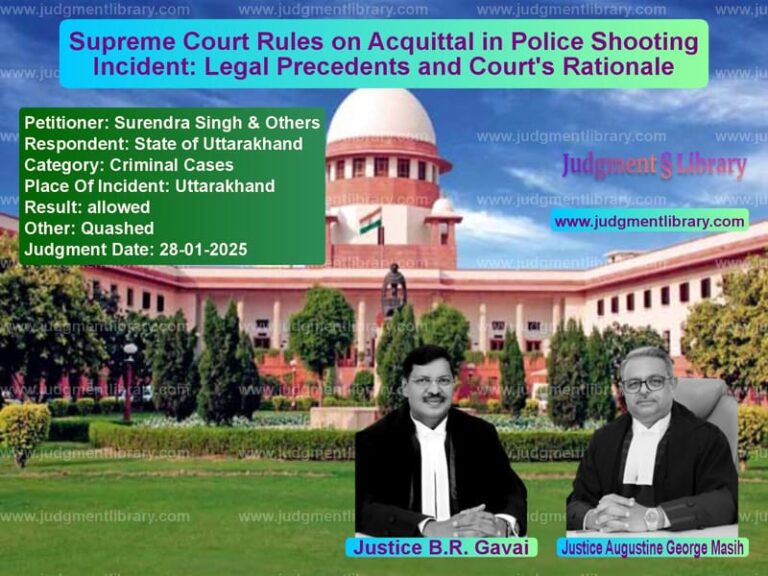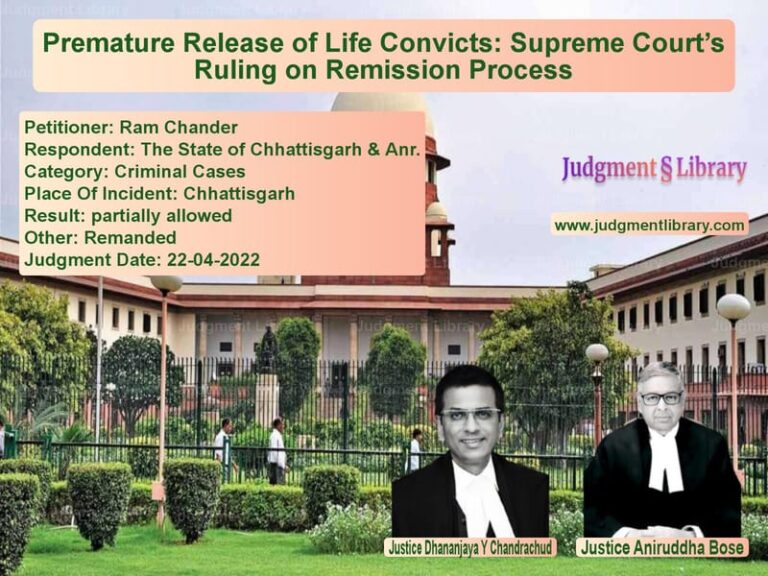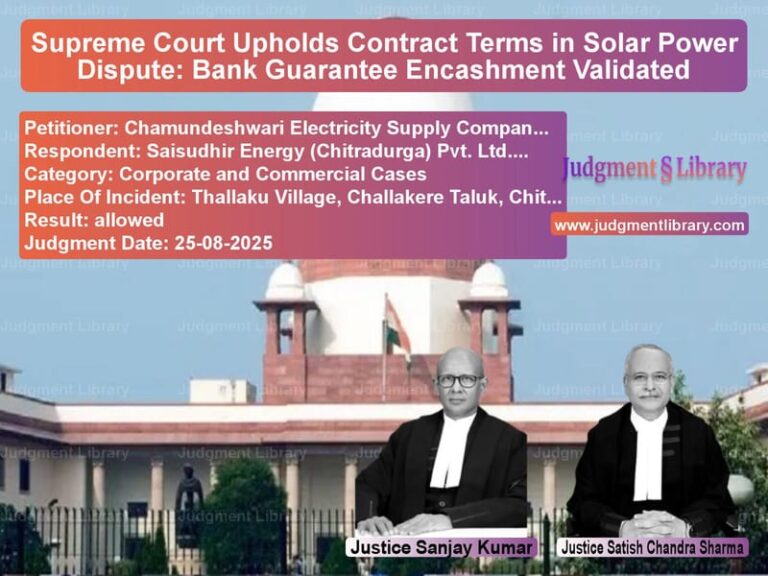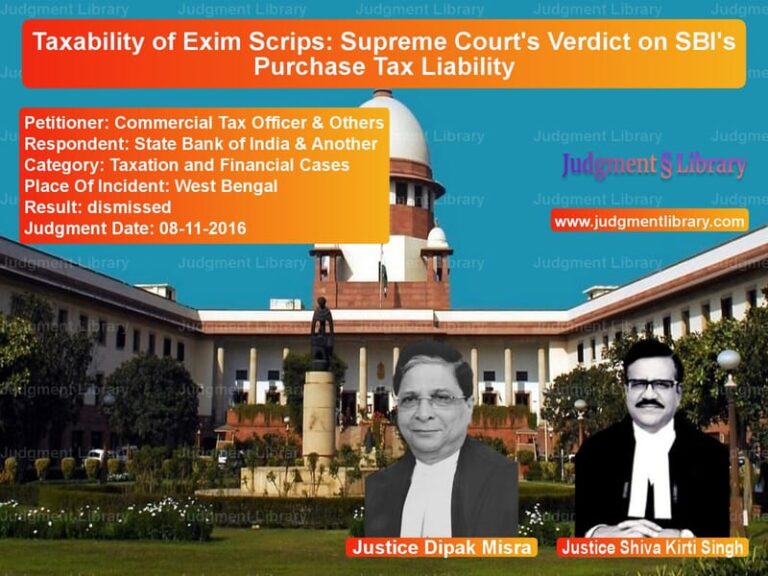Supreme Court Clarifies: Preference Shareholders Not Financial Creditors Under IBC
In a landmark judgment that clarifies the legal distinction between shareholders and creditors under the Insolvency and Bankruptcy Code, the Supreme Court of India has ruled that holders of Cumulative Redeemable Preference Shares (CRPS) cannot be treated as financial creditors and cannot initiate corporate insolvency proceedings. The judgment, delivered on October 28, 2025, by a bench comprising Justice K.V. Viswanathan and Justice J.B. Pardiwala, provides crucial guidance on the interpretation of financial debt and the rights of preference shareholders under Indian company law.
The case involved EPC Constructions India Limited (formerly Essar Projects India Limited) and M/s Matix Fertilizers and Chemicals Limited. The dispute originated from engineering and construction contracts executed between 2009 and 2010 for establishing a fertilizer complex in Panagarh Industrial Park, West Bengal. According to EPC Constructions, a sum of INR 572.72 crores became due and payable by Matix under these contracts.
The crucial turning point came in 2015 when Matix proposed to convert outstanding dues of up to Rs. 400 crores into Non-Cumulative Redeemable Preference Shares. After negotiations, EPC Constructions’ board approved the conversion into 8% Cumulative Redeemable Preference Shares through a resolution dated July 30, 2015. The board resolution clearly stated: “RESOLVED THAT subject to such statutory approvals as may be required, if any and pursuant to the provisions of Section 179, 186 and any other applicable provisions, if any, of the Companies Act, 2013 read with rules made thereunder and subject such consents and approvals, if any, as may be required, the consent of the Board of Directors of the Company be and is hereby accorded to make investment up to Rs. 400 Crores into 8% Cumulative Redeemable Preference Shares of Rs. 10/- each of Matix Fertilizer and Chemicals Limited (Matix) in one or more tranches.”
Pursuant to this resolution, Matix allotted 25,00,00,000 CRPS of Rs. 10 each aggregating to Rs. 250 crores to EPC Constructions on August 26, 2015. The terms included redemption after three years at par value with an 8% cumulative dividend.
When Corporate Insolvency Resolution Process was initiated against EPC Constructions in 2018, the company through its resolution professional demanded payment of INR 310 crores from Matix on account of maturity of CRPS. After Matix denied liability, EPC Constructions filed an application under Section 7 of the IBC before the National Company Law Tribunal (NCLT).
The NCLT dismissed the application, holding that CRPS constituted an investment rather than debt. This decision was upheld by the National Company Law Appellate Tribunal (NCLAT), leading to the appeal before the Supreme Court.
Before the Supreme Court, Mr. Niranjan Reddy, learned Senior Counsel for the appellant, strenuously argued that the true nature of the transaction in question must be assessed by unveiling the underlying intent, especially when the structure masked the borrowing arrangement. According to the learned Senior Counsel, the CRPS, in the present case, stricto sensu fulfilled all the ingredients required to constitute a “financial debt”, having the “commercial effect of borrowing”. According to the learned Senior Counsel, the transaction in question entered into by way of exchange of letters between the parties is a transaction in terms of Section 3(33) of the IBC fulfilling the ingredient of Section 5(8)(f) of the IBC. Learned Senior Counsel submitted that Matix understood the “conversion of receivables” as a “subordinate debt”; that the said proposal was for commercial purpose, i.e., to maintain a Debt-to-Equity ratio for further borrowings and commissioning the fertilizer plant and Matix admittedly committed to repay the aforesaid “Subordinate Debt” upon raising of equity at par within three years, thereby fulfilling the ingredient of “commercial effect of borrowing” with repayment obligations.
Mr. Mukul Rohtagi and Mr. Ritin Rai, learned Senior Advocates for the respondent, vehemently countered these submissions. They contended that under Section 3(37) of the IBC words and expressions used in the IBC but not defined in the Code but defined in the Companies Act, 2013 shall have the meaning assigned to them under the Companies Act. They contended by referring to Section 3(37) of the IBC read with Sections 2(64), 2(55), 2(84), 43, 47 and 55 of the Companies Act, 2013 that preference shares do not constitute debt and preference shareholders are not creditors of the Company. In their submission, preference shares being part of the share capital (and not debt capital), preference shareholders do not have a right to initiate insolvency proceedings against the company under Section 7 IBC which is a right available only with the financial creditors of the company. They further contend that under Section 5(8)(f) of the IBC, preference shares do not constitute a financial debt as defined. According to their submission, the contention of the appellant that preference shareholders can become a financial creditor runs contrary to the very fabric of the share capital of the Company and would blur the line between shareholders and creditor.
The Supreme Court, in its detailed analysis, emphasized the fundamental distinction between debt and equity in company law. The court noted: It is well settled in Company Law that preference shares are part of the company’s share capital and the amounts paid up on them are not loans. Dividends are paid on the preference shares when company earns a profit. This is for the reason that if the dividends were paid without profits or in excess of profits made, it would amount to an illegal return of the capital. Amount paid up on preference shares not being loans, they do not qualify as a debt.
The court extensively referred to Section 55 of the Companies Act, 2013, which stipulates that preference shares shall be redeemed only out of the profits of the company which would be otherwise available for dividends or out the proceeds of the fresh issue of shares made for the purpose of such redemption. This statutory limitation, the court observed, distinguishes preference shareholders from creditors.
Quoting from authoritative texts, the court emphasized: “It must be remembered that a preference shareholder is only a shareholder and cannot as a matter of course claim to exercise the rights of a creditor. Preference shareholders are only shareholders and not in the position of creditors. They cannot sue for the money due on the shares undertaken to be redeemed, and cannot, as of right, claim a return of their share money except in a winding-up. An unredeemed preference shareholder does not become a creditor.”
The court also referenced the conceptual distinction explained in Gower’s “Principles of Modern Company Law”: “The line between the holder of a debt instrument and a share is particularly narrow if the contrast is made with a preference shareholder, who is a member of the company, but a member whose share rights may limit the shareholder’s dividend to a fixed percentage of the nominal value of the share and give that shareholder no right to participate in surplus assets in a winding-up, and perhaps only limited voting rights. The main difference between the two in such a case may then be that the dividend on a preference share is not payable unless profits are available for distribution, whereas the debt holder’s interest entitlement is not subject to this constraint; and that the debt holder will rank before the preference holder in a winding-up.”
Addressing the appellant’s argument about unveiling the underlying intent of the transaction, the court firmly stated: The contention of Mr. Niranjan Reddy that the Court has to unveil the underlying intent especially when the outward structure masked the borrowing arrangements is absolutely without merit. As the board resolution dated 30.07.2015 clearly indicates, the appellant who before the issuance of CRPS had some receivables due on account of the construction contracts took a conscious call to accept the CRPS. In view of the issuance of CRPS, the earlier outstanding amount stood extinguished and the nature of relationship of the appellant with the respondent became that of a preference shareholder. There is no question of there being any underlying contrary intent as the only intent was to convert the debt into preferential shareholding. The egg having been scrambled, Mr. Reddy’s attempt to unscramble it, must necessarily fail.
The court also rejected the argument based on accounting entries, stating: Accounting Standards (AS 32) prescribe that a preference share that provides for mandatory redemption by the issuer for a fixed or determinable amount at a fixed or determinable future date, or gives the holder the right to require the issuer to redeem the instrument at or after a particular date for a fixed or determinable amount, is a financial liability. However, the treatment in the accounts due to the prescription of accounting standards will not be determinative of the nature of relationship between the parties as reflected in the documents executed by them.
Emphasizing the importance of the true nature of transactions, the court quoted from its earlier judgment: “The important question to be considered is the true nature of the transaction and whether in fact it had resulted in profit or loss to the assessee. In that context it is well settled that the way in which entries are made by the assessee in its books of account is not determinative of the question whether the assessee has earned any profit or suffered any loss.”
The Supreme Court’s judgment reinforces the fundamental principle that preference shareholders, despite having certain preferential rights, remain shareholders and not creditors. They cannot initiate insolvency proceedings under Section 7 of the IBC, which is a right exclusively available to financial creditors. This clarification is significant for corporate structuring and financing arrangements, ensuring that the distinction between equity and debt remains clear and legally enforceable.
The court dismissed the appeal, upholding the decisions of both the NCLT and NCLAT, and reaffirmed that preference shareholders must seek remedies through company law provisions rather than the insolvency framework when their shares are not redeemed. This judgment provides much-needed clarity on the rights of preference shareholders and maintains the structural integrity of the IBC framework.
Petitioner Name: EPC Constructions India Limited Through Its Liquidator – Abhijit Guhathakurta.Respondent Name: M/s Matix Fertilizers And Chemicals Limited.Judgment By: Justice K.V. Viswanathan, Justice J.B. Pardiwala.Place Of Incident: Panagarh Industrial Park, District Burdwan, West Bengal.Judgment Date: 28-10-2025.Result: dismissed.
Don’t miss out on the full details! Download the complete judgment in PDF format below and gain valuable insights instantly!
Download Judgment: epc-constructions-in-vs-ms-matix-fertilizer-supreme-court-of-india-judgment-dated-28-10-2025.pdf
Directly Download Judgment: Directly download this Judgment
See all petitions in Company Law
See all petitions in Bankruptcy and Insolvency
See all petitions in Corporate Governance
See all petitions in Shareholder Disputes
See all petitions in Corporate Compliance
See all petitions in Judgment by K.V. Viswanathan
See all petitions in Judgment by J.B. Pardiwala
See all petitions in dismissed
See all petitions in supreme court of India judgments October 2025
See all petitions in 2025 judgments
See all posts in Corporate and Commercial Cases Category
See all allowed petitions in Corporate and Commercial Cases Category
See all Dismissed petitions in Corporate and Commercial Cases Category
See all partially allowed petitions in Corporate and Commercial Cases Category

